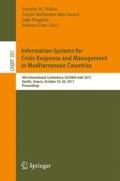Abstract
Response in crisis situations retains important risk mainly due to increased amount of unpredictable conditions at the incident scenery. Efficient management of such hazardous events necessitates the utilization of autonomous systems capable of operating in a dependable manner without placing the human life in danger. To achieve this, the design of rescue and exploration systems should retained increased operational capabilities, yet coupled with multilevel dependability. The paper at hand, aims to identify the different level of dependabilities that such a system should retain in order to operate in various crisis situations, while at the same time will provide conceptual solutions on how the different dependability levels can be endowed to the system. Moreover, it is proved that the endowed dependability should be maintained iteratively during the system’s lifespan by exploiting systems’ theory techniques preserving system’s dependable behavior in crisis management situations.
Access this chapter
Tax calculation will be finalised at checkout
Purchases are for personal use only
References
Laprie, J.C.: Dependability: Basic Concepts and Terminology: In English, French, German, Italian and Japanese, vol. 5. Springer, Wien (2013). doi:10.1007/978-3-7091-9170-5
Dubrova, E.: Fundamentals of dependability. Fault-Tolerant Design, pp. 5–20. Springer, New York (2013). doi:10.1007/978-1-4614-2113-9_2
Murphy, R.R., Tadokoro, S., Kleiner, A.: Disaster robotics. In: Siciliano, B., Khatib, O. (eds.) Springer Handbook of Robotics, pp. 1577–1604. Springer, Cham (2016). doi:10.1007/978-3-319-32552-1_60
Buckl, C., Knoll, A., Schieferdecker, I., Zander, J.: 10 Model-Based Analysis and Development of Dependable Systems. In: Giese, H., Karsai, G., Lee, E., Rumpe, B., Schätz, B. (eds.) MBEERTS 2007. LNCS, vol. 6100, pp. 271–293. Springer, Heidelberg (2010). doi:10.1007/978-3-642-16277-0_10
Jürjens, J., Wagner, S.: Component-based development of dependable systems with UML (2005)
Ruffaldi, E., Kostavelis, I., Giakoumis, D., Tzovaras, D.: ArchGenTool: a system-independent collaborative tool for robotic architecture design. In: International Conference on Methods and Models in Automation and Robotics, pp. 7–12. IEEE (2016)
Fink, S.: Crisis Management: Planning for the Inevitable. American Management Association, New York (1986)
Looije, R., Neerincx, M., Kruijff, G.J.M.: Affective collaborative robots for safety & crisis management in the field. In: Intelligent Human Computer Systems for Crisis Response and Management, (ISCRAM 2007), Delft, Netherlands, vol. 1 (2007)
Zarzhitsky, D., Spears, D.F., Spears, W.M.: Distributed robotics approach to chemical plume tracing. In: International Conference on Intelligent Robots and Systems, pp. 4034–4039. IEEE (2005)
Murphy, R.R., Kleiner, A.: A community-driven roadmap for the adoption of safety security and rescue robots. In: International Symposium on Safety, Security, and Rescue Robotics, pp. 1–5. IEEE (2013)
Latscha, S., Kofron, M., Stroffolino, A., Davis, L., Merritt, G., Piccoli, M., Yim, M.: Design of a hybrid exploration robot for air and land deployment (herald) for urban search and rescue applications. In: International Conference on Intelligent Robots and Systems, pp. 1868–1873. IEEE (2014)
Danna, V.: A new generation of military robots. RESEARCH Appl. AI Comput. Animation 7, 2–5 (2004)
Kostavelis, I., Giakoumis, D., Malasiotis, S., Tzovaras, D.: RAMCIP: towards a robotic assistant to support elderly with mild cognitive impairments at home. In: Serino, S., Matic, A., Giakoumis, D., Lopez, G., Cipresso, P. (eds.) MindCare 2015. CCIS, vol. 604, pp. 186–195. Springer, Cham (2016). doi:10.1007/978-3-319-32270-4_19
Quigley, M., Conley, K., Gerkey, B., Faust, J., Foote, T., Leibs, J., Wheeler, R., Ng, A.Y.: ROS: an open-source robot operating system. In: ICRA Workshop. vol. 3, p. 5. Kobe (2009)
Leveson, N.: Engineering a Safer World: Systems Thinking Applied to Safety. MIT press, Cambridge (2011)
Leveson, N.: A systems approach to risk management through leading safety indicators. Reliab. Eng. Syst. Safety 136, 17–34 (2015)
Chen, J., Zhang, S., Lu, Y., Tang, P.: STPA-based hazard analysis of a complex UAV system in take-off. In: International Conference on Transportation Information and Safety, pp. 774–779. IEEE (2015)
Dokas, I.M., Feehan, J., Imran, S.: Ewasap: An early warning sign identification approach based on a systemic hazard analysis. Saf. Sci. 58, 11–26 (2013)
Chatzimichailidou, M.M., Dokas, I.M.: Risksoap: introducing and applying a methodology of risk self-awareness in road tunnel safety. Accid. Anal. Prev. 90, 118–127 (2016)
Chatzimichailidou, M.M., Dokas, I.M.: Introducing risksoap to communicate the distributed situation awareness of a system about safety issues: an application to a robotic system. Ergonomics 59(3), 409–422 (2016)
Author information
Authors and Affiliations
Corresponding author
Editor information
Editors and Affiliations
Rights and permissions
Copyright information
© 2017 Springer International Publishing AG
About this paper
Cite this paper
Zacharaki, A., Kostavelis, I., Dokas, I. (2017). Towards Developing Dependable Systems Suitable for Crisis Management Applications. In: Dokas, I., Bellamine-Ben Saoud, N., Dugdale, J., Díaz, P. (eds) Information Systems for Crisis Response and Management in Mediterranean Countries. ISCRAM-med 2017. Lecture Notes in Business Information Processing, vol 301. Springer, Cham. https://doi.org/10.1007/978-3-319-67633-3_7
Download citation
DOI: https://doi.org/10.1007/978-3-319-67633-3_7
Published:
Publisher Name: Springer, Cham
Print ISBN: 978-3-319-67632-6
Online ISBN: 978-3-319-67633-3
eBook Packages: Business and ManagementBusiness and Management (R0)

